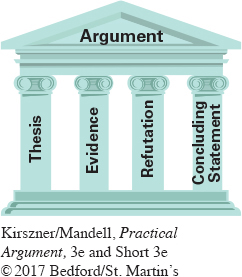Sanchez, College Should Be for Everyone
EXERCISE 5.5
The following student essay, “College Should Be for Everyone,” includes all the elements of a deductive argument. The student who wrote this essay was responding to the question, “Should everyone be encouraged to go to college?” After you read the essay, answer the questions below, consulting the outline on the previous page if necessary.
COLLEGE SHOULD BE FOR EVERYONE
CRYSTAL SANCHEZ
1
Overview of issue
Thesis statement
Until the middle of the twentieth century, college was largely for the rich. The G.I. Bill, which paid for the education of veterans returning from World War II, helped to change this situation. By 1956, nearly half of those who had served in World War II, almost 7.8 million people, had taken advantage of this benefit (U.S. Department of Veterans Affairs). Even today, however, college graduates are still a minority of the population. According to the U.S. Census Bureau, only 27.5 percent of Americans age twenty-
2
Evidence: Point 1
One reason everyone should have the opportunity to go to college is that a college education gives people a chance to discover what they are good at. It is hard for people to know if they are interested in statistics or public policy or marketing unless they have the chance to explore these subjects. College—
3
Evidence: Point 2
Another reason everyone should have the opportunity to go to college is that more and more jobs are being phased out or moved overseas. Americans should go to college to develop the skills that they will need to get the best jobs that will remain in the United States. Over the last few decades, midlevel jobs have been steadily disappearing. If this trend continues, the American workforce will be divided in two. One part will consist of low-
Page 135
4
Evidence: Point 3
Perhaps the best reason everyone should have the opportunity to go to college is that education is an essential component of a democratic society. Those without the ability to understand and analyze news reports are not capable of contributing to the social, political, and economic growth of the country. Democracy requires informed citizens who will be able to analyze complicated issues in areas such as finance, education, and public health; weigh competing claims of those running for public office; and assess the job performance of elected officials. By providing students with the opportunity to study subjects such as history, philosophy, English, and political science, colleges and universities help them to acquire the critical-
5
Refutation of opposing arguments
An irrelevant side issue used as a diversion
Some people oppose the idea that everyone should have the opportunity to attend college. One objection is that educational resources are limited. Some say that if students enter colleges in great numbers they will overwhelm the higher-
Page 136
6
Concluding statement
A college education gave the returning veterans of World War II many opportunities and increased their value to the nation. Today, a college education could do the same for many citizens. This country has an obligation to offer all students access to an affordable and useful education. Not only will the students benefit personally, but the nation will also. If we do not adequately prepare students for the future, then we will all suffer the consequences.
Works Cited
“Open Educational Resources.” Center for American Progress, 7 Feb. 2012, www.americanprogress.org/
Stout, Chris. “Top Five Reasons Why You Should Choose to Go to College.” Ezine Articles, 2008, ezinearticles.com/
“Ten Skills for the Future Workforce.” The Atlantic, 22 June 2011, www.theatlantic.com/
United States, Census Bureau. “Bachelor’s Degree Attainment Tops 30 Percent for the First Time, Census Bureau Reports.” US Census Bureau Newsroom, 23 Feb. 2012, www.census.gov/
--, Department of Veterans Affairs. “Born of Controversy: The GI Bill of Rights.” GI Bill History, 20 Oct. 2008, www.va.gov/

Identifying the Elements of a Deductive Argument
Paraphrase this essay’s thesis.
What arguments does the writer present as evidence to support her thesis? Which do you think is the strongest argument? Which is the weakest?
What opposing arguments does the writer address? What other opposing arguments could she have addressed?
Page 137
What points does the conclusion emphasize? Do you think that any other points should be emphasized?
Construct a syllogism that expresses the essay’s argument. Then, check your syllogism to make sure it is sound.